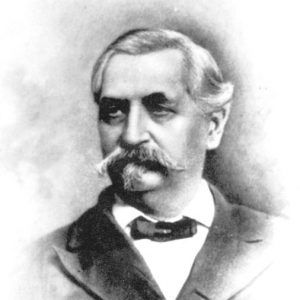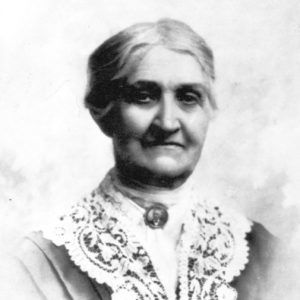calsfoundation@cals.org
James Mitchell (1832–1902)
James Mitchell was president and editor-in-chief of the Arkansas Democrat from the time he purchased the paper with W. D. Blocher in 1878 until shortly before his death in 1902. As editor, Mitchell made the paper a powerful statewide force backing Democratic policies and candidates. At the same time, he argued forcefully, both in the paper and through frequent public speeches, for economic diversification in the state, for educational improvement, for equal pay and improved opportunities for women, and for other progressive measures.
James Mitchell was born on May 8, 1832, at Cane Hill (Washington County) to James Mitchell, a farmer, and Mary Ann Webber. He was the third of ten children whose parents had moved their family from Indiana to the Arkansas Territory about 1830. As a youth, Mitchell assisted his father on the family farm and attended common schools during the winters. In 1846, Mitchell attended school in Fort Smith (Sebastian County), and in 1850, he entered Cane Hill Collegiate Institute, later renamed Cane Hill College. After a five-month term at the institute, Mitchell taught in the Choctaw Nation for two years in order to finance his return to Cane Hill Institute to study from 1854 to 1855. Mitchell’s interests as a student were Latin, rhetoric, and history, subjects from which he later drew heavily as a teacher, writer, and public speaker.
Mitchell received appointment as Deputy United States Surveyor for Kansas and Nebraska in 1855. A journal Mitchell kept while he was surveying notes that he opposed the anti-Catholic, anti-immigration positions of the Know-Nothing Party, and it offers insight into his character and beliefs. A Protestant, Mitchell wrote in the journal that “toleration in matters of faith is the grand distinguishing feature in the Constitution of the United States… It makes us different from, and exalts us above, every other nation under heaven.” He went on to ask, “What right have you or I to oppose foreign emigration when we remember that foreigners battled for the liberties which we now enjoy?”
By 1859, Mitchell had returned to Arkansas and opened a school at Evansville (Washington County). Mitchell married Sarah Elizabeth Latta January 31, 1860, at the Latta family homestead at Vineyard (Washington County). The couple had eight children.
In 1860, Mitchell was elected to the Arkansas House of Representatives as a Democrat. He chaired the House Education Committee and opposed the state’s 1861 secession from the Union without a popular vote. When Arkansas entered the conflict, Mitchell enlisted in the Confederate army in May 1861 and mustered out in June 1865. At the war’s end, Mitchell joined his family in Bonham, Texas, where Sarah Elizabeth and their daughter had gone to be with relatives to escape the hardships of the war. Mitchell taught school in Texas until the family returned to Cane Hill in 1866, where Mitchell farmed, probably on the farm he had purchased near Cane Hill soon after he married. Mitchell also taught at Cane Hill College. In 1868, he was elected to a professorship at the reorganized Cane Hill College, which had been burned during the Civil War. He remained on the faculty for six years. During this period, college officials conferred a BA degree on Mitchell.
In 1874, Mitchell was elected professor and chair of history and English literature at Arkansas Industrial University in Fayetteville (Washington County) (now the University of Arkansas (UA)). He taught there for two years before he moved to Little Rock (Pulaski County) to become editor-in-chief of the Arkansas Gazette. In 1878, Mitchell left the Gazette and purchased the Arkansas Democrat with William Durbin Blocher.
When Blocher died in 1879, the paper experienced financial difficulties, since Blocher had been the business manager, and his death left Mitchell with editorial as well as managerial duties. Conditions improved when Mitchell added James R. Bettis as a partner and business manager. An added factor that benefited the paper in its early years was its support for David Walker’s candidacy for the United States Senate against the rival Arkansas Gazette’s choice, Robert W. Johnson. Walker’s win, credited to the Democrat, aided subscriptions and expanded advertising of the newspaper.
As a journalist, Mitchell believed his mission was to teach. The paper remained loyal to conservative Democratic Party politics, and in his initial editorial, Mitchell declared support for “Democratic agencies and instrumentalities” but promised that the paper would maintain independence of thought and action. As editor, he stressed the need for economic diversification in order for the state to prosper. Through the paper and in his public addresses, Mitchell also supported a strong system of public schools, improved teacher pay, and effective college-level instruction, insisting that college should nurture patriotism. The paper also supported an 1879 resolution introduced in the state legislature to protect African Americans in all political, legal, and property rights as fully as if they were white.
Mitchell also strongly advocated rights for women, including equality of opportunity, co-education at all levels, access to the professions, civil rights, and legal guarantees. In addressing inequities in teacher salaries, he argued that merit rather than gender should determine compensation.
Mitchell was heavily involved in community work and in professional journalism societies. He received numerous recognitions, including his appointment by Governor James Eagle to the Arkansas commission to plan the state’s role in the 1893 Columbian Exposition in Chicago, as well as his election as president of the state commission. He helped secure private and public funds for the commission’s project at the exposition. Mitchell also served as a member of the Little Rock Public School Board, which named one of its schools—James Mitchell School—in his honor. Mitchell remained active in community affairs until shortly before his death on June 27, 1902, at Battle Creek Sanitarium in Little Rock after a brief illness. The funeral was held at his home on Spring Street, and he was buried at Mount Holly Cemetery in Little Rock.
For additional information:
Allsopp, Fred W. History of the Arkansas Press for a Hundred Years and More. Little Rock: Parke-Harper, 1922.
Basham, Robert Harold, “A History of Cane Hill College.” Ed.D. diss., University of Arkansas at Fayetteville, 1969.
Dougan, Michael. B. Community Diaries: Arkansas Newspapering, 1819–2002. Little Rock: August House, 2003.
“Jas. Mitchell, Death Yesterday.” Arkansas Democrat. June 27, 1902, pp. 1,5.
“Mitchell Democrat’s Founding Father.” Arkansas Democrat. October 3, 1971, p. 13.
Ross, Frances Mitchell, “Civil War Letters from James Mitchell to His Wife, Sarah Elizabeth Latta Mitchell.” Arkansas Historical Quarterly 37 (Winter 1978): 306–317.
———. “James Mitchell, Spokesman for Women’s Equality in Nineteenth Century Arkansas.” Arkansas Historical Quarterly 43 (Autumn 1984): 222–235.
Frances Mitchell Ross
University of Arkansas at Little Rock









Comments
No comments on this entry yet.